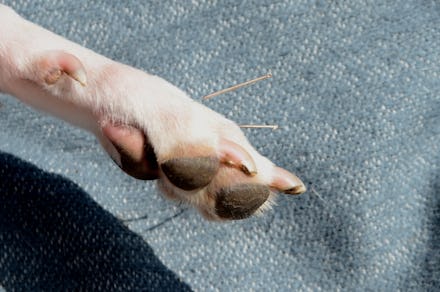Dog acupuncture is a thing. But does sticking needles in your pet actually work?

My neighbor’s dog barks all the time. It’s a high, tight sound that drives both me and my own dogs nuts, especially when we’re stressed. I want to hate the dog, but it sounds kind of forlorn and stressed itself, so I just feel sorry for it. “My neighbor’s dog used to do that,” a friend told me the other day when I complained to her, “He was really high strung. But then she took her dog to get acupuncture and now he’s way less anxious and never barks.” I was instantly curious.
Veterinary acupuncture, it turns out, has been practiced for thousands of years and the original practitioners were called “horse priests.” You’ve probably heard of Traditional Chinese Medicine, or TCM, but there’s also Traditional Chinese Veterinary Medicine, or TCVM. Still, modern science isn’t exactly unanimous on how acupuncture in general works. Some researchers say that its effects could be neurological and some contend that it could relieve inflammation in the body, but most people agree that it does, in fact, work.
Here’s one (warning: It’s woo-woo) explanation of why: “Acupuncture works on animals by balancing energy within the body in order to encourage healing,” Jamie Bacharach, a Jerusalem-based acupuncturist, told me. “Meridians, or energy channels, flow through the bodies of animals. When energy known as 'qi' is disrupted or not properly balanced, illness can follow."
She says that “by inserting acupuncture needles in the appropriate acupuncture points, a trained acupuncturist can re-direct energy, thus balancing the energy within the body in order to heal specific ailments and illnesses.” TCVM relies on the idea that there is an energy in the body, ‘chi’ or ‘qi,’ and that all illness is caused by an imbalance in that energy. Acupuncture is meant, then, to rebalance that energy for optimum health.
However you decide to perceive all that energy talk, veterinary researchers have found acupuncture to be effective for functional issues like spinal cord injury and hepatitis. But acupuncturists like Bacharach have found it helpful for a whole range of issues. “There are many different things that dog acupuncture can be effective for,” she said. “Arthritis, joint disease, metabolic disease, indigestion, allergies, separation anxiety, trauma-related pain, and inflammation are all examples of common canine ailments that can be healed with dog acupuncture.”
I told Bacharach the story about my friend’s neighbor’s anxious dog who was rumored to be healed by acupuncture and asked if she thought there might be any truth to it. “Absolutely. Acupuncture is often such a calming experience for dogs that they fall asleep during acupuncture treatment,” she said. “When anxiety, specifically, is targeted by dog acupuncture, the effects can be instantaneous and overt. The physiological effects of dog acupuncture can not only relieve physical discomfort, thereby relieving anxiety — they can also relax mental anguish, discomfort, and fear as an immediate effect.”
Of course, not every veterinarian agrees that acupuncture is an effective treatment. In fact, some are pretty strongly averse to it. “Animal acupuncture perpetuates a fraud,” David Ramey, an equine veterinarian who worked on the American Veterinary Medicine Association’s guidelines on complementary and alternative therapies, told Slate. “It also dumbs down the practice of veterinary medicine and allows people to promote their nonsense at the expense of others.”
There isn’t evidence to suggest that veterinary acupuncture is actively harmful, but if an animal is being treated with an ineffective treatment, they are less likely to get the medical interventions that they actually need. Keep in mind that if you choose to try it, it is considered by most vets as a supplementary treatment and not necessarily one that should stand alone.
Personally, I love alternative medicine that I can take into my own hands, though, so I had fantasies that my very emotional 70-pound puppy, David Bowie, might be lulled into obedience by acupuncture. I might have been a little overexcited when I suggested to Bacharach that I could try dog acupuncture at home.
“Dog acupuncture is not a ‘DIY’ practice,” she said emphatically. “The benefits of dog acupuncture can be remarkable, but will only be felt when the acupuncture is practiced by an experienced and trained acupuncturist. Pet owners must recognize that not only can self-administered acupuncture treatments not prove effective, but they could also have damaging results. Find an experienced animal acupuncturist to diagnose and treat the problems ailing your pet.”